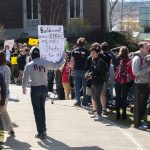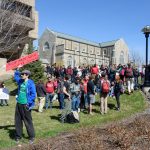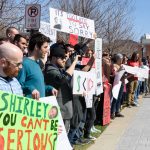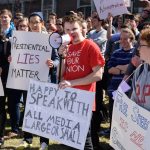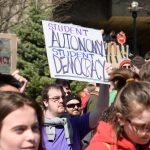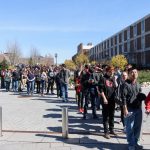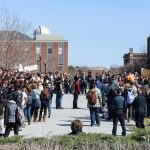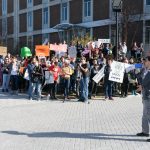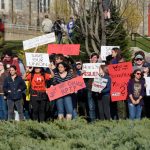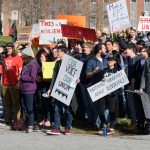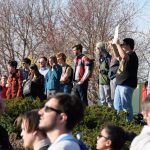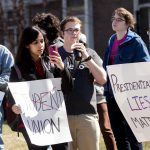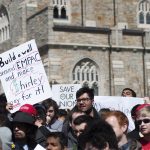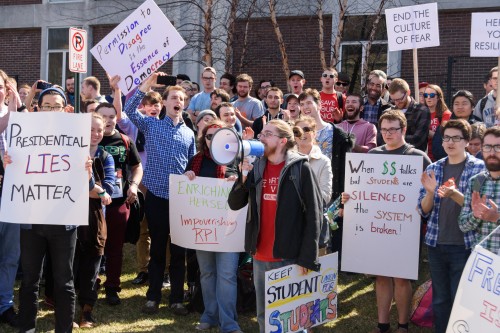 MEMBERS OF THE RENSSELAER COMMUNITY HOLD signs on the path leading to EMPAC to protest a perceived lack of communication from Institute administrators regarding pressing issues.
MEMBERS OF THE RENSSELAER COMMUNITY HOLD signs on the path leading to EMPAC to protest a perceived lack of communication from Institute administrators regarding pressing issues.“Freedom requires no prior approval!” declared Professor Bill Puka to nearly 1,000 students, faculty, and alumni who gathered to express their discontent with Rensselaer’s administration in a peaceful protest.
Following a Washington Post report on the Institute’s finances and disgruntlement over proposed Student Life changes, among other grievances, students at RPI spent the previous week organizing an event in front of the Experimental Media and Performing Arts Center.
Posters and social media posts flooded the campus in an effort to get the word out. “2 pm, EMPAC” and “Save our Union” were common themes among announcements. Puka invited students to join his Ethics and Democracy class for their annual Spring Serenade, this year held in front of EMPAC from 2–5 pm on the day of the Spring Town Meeting.
“I was a bit worried in the beginning,” said Jeremy Feldman ’16, “but then I started seeing a trickle of students down the hill. I was really proud to see students get off the internet and head down to EMPAC.”
Students raised signs, including “Resilience ≠ Silence” and “Why Not Change the President?” playing on this year’s theme of “Resilience” and the school’s motto, “Why Not Change the World?”
“For too long, RPI students were afraid to say anything,” trumpeted Emi Phillips ’17. “When this event was being planned, too many people were afraid that they would lose financial aid, they would be fired from jobs, they would be kicked out. The fact that people are afraid to say that something is wrong means that something is fundamentally wrong.”
“The discontent of students is palpable,” Grand Marshal Marcus Flowers ’16 told The Poly. “But it’s not our job as student leaders to get angry; it’s our job to take these concerns to the discussion table. And if we get kicked away from the discussion table, it’s our job to come back again, and again, and again until the students get what they need.”
Other attendees observed the crowd from afar. Jane Edgington ’18 said, “I’m really impressed with the policy efficacy of RPI students and it’s something obviously that a lot of people care about … I think it’s time students had a voice in something.”
A member of the Class of 2016 told The Poly that “it’s good to see students taking a stand.” A student from the Class of 2017 said that she was “really happy to see this turnout,” and was expecting closer to 100—not nearly 1,000—students to attend.
As students were let into the EMPAC Theater, those in the back of the line found themselves sitting in the lobby listening to and watching the live stream of the meeting taking place in the closed auditorium. Protesters referred to the theater as an omnious “within,” and many voiced their confusion over why the smaller auditorium was being utilized when a large number of people were interested in getting inside.
The protest continued through the afternoon, with students, faculty, and alumni taking turns on the megaphone to express their discontent. Some shared stories, others took time to commend those officials present, such as Public Safety and RPI Ambulance. Along that strain, students praised their professors who “laid their job on the line” in the face of this administrative disgruntlement.
When energy seemed to wane, the crowd would rally in a robust round of singing the alma mater. Dr. Jackson was greeted to this upon her exit of EMPAC and joined in. Many students later remarked that they found it both a sound political move on her part, while others considered it lacking sincerity. Capping off her presence at the protest, Jackson shook the hands of a few students, and walked off the scene back to her office in the Troy Building.
A small group of students attempted to swarm Dr. Jackson and her staff, but the great majority persisted in maintaining the peaceful quality of the protest and stopped the insurgent few.




